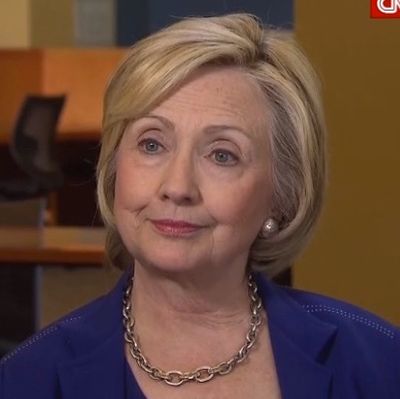
Since launching her campaign in April, Hillary Clinton has mostly ignored the national press, and her campaign’s decision to keep reporters in a rope pen last weekend did not improve their historically dicey relationship. On Tuesday night she tried to smooth things over in her first televised interview as a 2016 candidate. As New York’s Annie Lowrey explained when Emailgate first broke, the controversy is likely the result of Clinton trying to avoid bad press: “You loathe the idea of your personal correspondence getting out to a press you consider pathological, so you jury-rig a private email account and end up in the midst of a massive media cluster anyway.” But in her interview with CNN’s Brianna Keilar, Clinton tried to shift the blame from the media (and herself), pointing instead to her old foe “the vast right-wing conspiracy.”
When asked to clarify why she decided to conduct State Department business using her private emails, and delete the emails her staff deemed personal, Clinton said she actually “went above and beyond what anybody could have expected” by turning over more than 55,000 pages to the State Department. “Everything I did was permitted, there was no law, there was no regulation, there was nothing that did not give me the full authority to decide how I was going to communicate,” Clinton said. She also alluded to her previous claim that she only wanted to carry one device, saying, “Maybe it was because I am not the most technically capable person and wanted to make it as simple as possible.”
Clinton also defended her family’s charity, while claiming she played “only a small role” during the “year and a half” she was there (though the name was changed to the Bill, Hillary, and Chelsea Clinton Foundation). “It produced results,” Clinton said. “I have no plans to say or do anything about the Clinton foundation other than to say how proud I am of it. I think for the good of the world its work should continue.”
It’s true, as Clinton noted, that congressional Republicans are running with the scandal accusations, but she painted questions about her trustworthiness as a total fabrication by the right. “I think when you are subjected to the kind of constant barrage of attacks that are largely fomented by and coming from the right … I think it’s understandable that when questions are raised, people maybe are thinking about them and wondering about them,” Clinton said. “This has been a theme that has been used against me and my husband for many, many years.”
Throughout the interview she was careful to point out that while questions about her credibility are “unfounded,” she knows journalists are just doing their job. Recent polls have shown that a majority of Americans do not consider Clinton trustworthy, but when pressed on the issue she said, “Well, people should and do trust me and I have every confidence that that will be the outcome of this election.”
Clinton dodged on a question about Senator Bernie Sanders’s rising popularity among Democrats. “First of all, I always thought this would be a competitive race,” Clinton said. “So I am happy to have a chance to get out and run my campaign as I see fit and let other candidates do exactly the same.” However, she was willing to call out some of her potential GOP rivals. She said she was “very disappointed” by Donald Trump’s remarks on Mexican immigrants, adding, “I feel very bad and very disappointed with him — and with the Republican Party for not responding immediately and saying, ‘Enough, stop it.’”
Then she pivoted to attacking the entire GOP field on immigration reform, saying, “They’re on a spectrum of hostility, which I think is really regrettable in a nation of immigrants like ours.” When asked about Jeb Bush specifically, she said, “He doesn’t believe in a path to citizenship. If he did at one time, he no longer does.”
“Hillary Clinton will say anything to get elected, and her numerous flip-flops on immigration prove it,” Bush campaign spokeswoman Emily Benavides responded. “As he outlined in his book on this issue, Gov. Bush believes in a conservative legislative solution to fix our broken immigration system that includes earned legal status for those currently in the country after they pay fines and taxes, learn English and commit no substantial crimes while securing our border.”
But as the Miami Herald explains, “citizenship” and “earned legal status” are not the same thing:
Bush has favored citizenship in the past. But in his book Immigration Wars, and recently on the campaign trail, he has instead backed legal status without citizenship, suggesting that might be a more achievable goal given contentious immigration politics.
So Clinton was actually correct, despite what the Bush camp says. Obviously, the GOP isn’t solely responsible for persistent questions about the Clintons’ ethics, but Hillary does have a point.






























